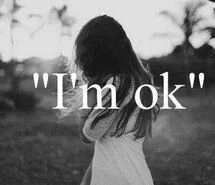Triggered
Trigger Warning: Blood, Emetophobia, Suicidal Thoughts
It’s a word used increasingly more often. But what does “triggered” really mean?
In technical terms, the word describes an experience where an outside stimulus causes a person to react in a certain way based on past experiences. When I add a “trigger warning” to the top of a post, it’s my way of saying that I am about to talk bluntly about a topic that may be hard for people to read about directly. If someone finds a particular topic triggering, it’s easier to skip thinking about it, so these warnings help people avoid a reaction.
Being triggered emotionally, to me, feels like having an allergic reaction. Instead of physical symptoms of my body going out of control, however, it’s in my head. I can be having a completely fine day, doing whatever I was doing at work or at home, and I see, hear, or somehow experience something that reminds me of a very negative experience in the past. Thankfully, this doesn’t happen often, but when it does, I feel like my thoughts skip so far ahead that my usual methods of controlling them with CBT techniques doesn’t work.
For example, if I am watching a TV show and a character vomits blood, I remember the time when I was in the hospital and a similar thing happened to me. I can suddenly think something’s wrong with me even if I’ve felt fine all day and have literally only had that happen to me once in my entire life. Or, I’m playing a video game that deals with suicide, and I am reminded of the negative thoughts that plagued me junior year and instantly become afraid that even thinking of it will bring that time back. Anything like that sets a panic in me that is irrationally high compared to the stimulus and, like an allergic reaction, continues to spread.
In the moment, I tend to skip ahead to a worst-case scenario, and plan for that. My planning can get quite obsessive, and it isn’t until later - sometimes a few hours, sometimes even longer - that I realize that things aren’t necessarily as bad as I thought they were. At that point, it’s a lot easier to spot holes in my logic, pick out where my thinking went awry, and fix it. But in-between, it’s very hard to interrupt what feels like a wild train ride with no one in the conductor’s seat.
I’m very thankful that this doesn’t happen very often. I do look to the past a lot for cues, but I have mostly gotten used to things that have happened to and around me. I try to keep my defenses strong, but I’m always ashamed when something from my past affects me in an abnormal way. I feel like a failure to cope, a weak person, and I get angry at anyone who comments on how poorly I’m handling things.
It’s not that I don’t recognize the thought patterns are going awry. It’s not that I think of myself as special and that having a mental illness gives me a free pass to freak out whenever I like. But, at the same time, I need people around me to realize that I am not necessarily able to stop being “triggered” at a convenient time, and bringing attention to it only makes things worse by reminding me how bad of a job I’m doing. At some point, sooner or later, I will be back to my normal self.
This week, I’ve seen a lot of year-end recaps where people are looking back at a very stressful year. It’s been hard for everyone I know to cope with the pandemic in a variety of ways. I’m sure people will experience memories of 2020 differently than other years, and some people may even find new things triggering.
My New Year’s resolution is to try to, while remaining cautious of things that I know bother me, try to look to the future instead of the past. This week, I’ve caught myself getting caught up in the past in a variety of ways. But with a vaccine for COVID-19 on the horizon heralding the promise of things returning to (or at least getting closer to) normal, I want to find a way to look forward to happy experiences instead of reliving old ones. It’ll be a tough thought pattern to break, but I hope to accomplish it this year - and I hope all of you have a wonderful 2021!
Ellie, a writer new to the Chicago area, was diagnosed with OCD at age 3. She hopes to educate others about her condition and end the stigma against mental illness.





